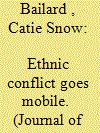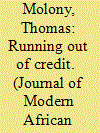| Srl | Item |
| 1 |
ID:
138833


|
|
|
|
|
| Summary/Abstract |
This analysis contributes to the body of research testing the effect of mobile phone availability on the probability of violent conflict by shifting the unit of analysis to that of distinct ethnic groups. This approach provides two important advantages. First, it tests the robustness of this relationship by determining whether this effect maintains when shifted to a more rigorous and theoretically appropriate level of analysis. Second, shifting the analysis to the group level also enables tests of specific characteristics that may condition the effect of mobile phone availability on violent collective action. The first set of characteristics test whether mobile phone availability primarily increases a group’s opportunities to engage in violent collective action as a result of decreased organizational costs due to diminished communication costs. The second set of characteristics explore whether mobile phone availability makes violent collective action more likely as a result of increasing a group’s motivation to organize, thanks to enabling more efficient communication about shared grievances between group members. The results yield mixed support for both of these potential mechanisms, providing needed insight into the dynamics at play in this relationship – a matter that very much remains in the ‘black box’ at this point in time.
|
|
|
|
|
|
|
|
|
|
|
|
|
|
|
|
| 2 |
ID:
087366


|
|
|
|
|
| Publication |
2008.
|
| Summary/Abstract |
Poor farmers often lack credit to purchase agricultural inputs, and rely on their buyers to provide it. This paper considers the effects of mobile phones on traders of perishable foodstuffs operating between Tanzania's Southern Highlands and Dar es Salaam's wholesale market, with a particular focus on the importance of credit in the relationship between potato and tomato farmers and their wholesale buyers. It argues that the ability to communicate using these new information and communication technologies (ICTs) does not significantly alter the trust relationship between the two groups. It also suggests that farmers, in effect, often have to accept the price they are told their crops are sold for - irrespective of the method of communication used to convey this message - because their buyers are also their creditors. In this situation, many farmers are unable to exploit new mobile phone-based services to seek information on market prices, and potential buyers in other markets. Doing so runs the risk of breaking a long-term relationship with a buyer who is willing to supply credit because of their established business interaction. It is suggested that, under a more open system than currently exists in Tanzania, mobile-payment ('m-payment') applications should target these creditor-buyers as key agents in connecting farmers to the credit they so often require.
|
|
|
|
|
|
|
|
|
|
|
|
|
|
|
|